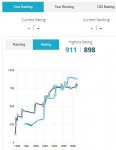TestMatch
U19 Cricketer
The ICC Player Rankings are the "official" guide to the relative merits of batsmen, bowlers and all-rounders in Test match and ODI cricket. They take into account bowling quality, opposition rankings and pitch conditions. Currently, for example, Joe Root and Steyn have a rating of about 900 in tests.
Below is a list of the average ICC CAREER RATINGS of some notable players.
D. Bradman: 855.37
J. Hobbs: 799.00
Brian Lara: 783.55
L. Hutton: 781.00
Gary Sobers: 780.85
RN Harvey: 777.70
H. Sutcliffe: 775.48
K.C. Sangakkara: 762.80
Viv Richards: 762.74
E.D Weekes: 760.50
K Barrington: 747.20
W. Hammond: 745.40
Javed Miandad: 743.12
R. Dravid: 741.79
M. Hussey: 738.47
R.T. Ponting: 736.86
S.M Gavaskar: 736.53
A. Border: 736.00
J.H. Kallis: 734.60
S.R. Tendulkar: 731.86
K.P. Pietersen: 730.80
M.J. Clarke: 727.24
M.L. Hayden: 723.27
G. Chappell: 712.87
G. Headley: 711.77
S. Chanderpaul: 709.19
Jayawardene: 705.22
V. Sehwag: 703.94
Inzamam-ul-Haq: 697.55
A. Kallicharran: 697.03
G.C. Smith: 695.97
R. Kanhai: 688.58
A.N. Cook: 685.58
A.B. de Villiers: 682.40
C.G. Greenidge: 681.91
Mohammad Yousuf: 681.21
H.M. Amla: 670.02
C. Lloyd: 667.29
F. Worrell: 665.39
S. Waugh: 664.57
D. Haynes: 655.39
S. Anwar: 649.11
M. Waugh: 646.71
G. Boycott: 640.95
G. Kirsten: 639.85
A. Flower: 637.92
Hanif Mohammad: 635.42
V.V.S. Laxman: 632.47
Saeed Ahmed: 632.46
A. Stewart: 631.77
M. Atherton: 630.94
C. Walcott: 630.23
M. Slater: 629.92
G. Gooch: 629.70
S. Jayasuriya: 576.27
Click here for more info on how the rankings are calculated: ICC Player Rankings
Below is a list of the average ICC CAREER RATINGS of some notable players.
D. Bradman: 855.37
J. Hobbs: 799.00
Brian Lara: 783.55
L. Hutton: 781.00
Gary Sobers: 780.85
RN Harvey: 777.70
H. Sutcliffe: 775.48
K.C. Sangakkara: 762.80
Viv Richards: 762.74
E.D Weekes: 760.50
K Barrington: 747.20
W. Hammond: 745.40
Javed Miandad: 743.12
R. Dravid: 741.79
M. Hussey: 738.47
R.T. Ponting: 736.86
S.M Gavaskar: 736.53
A. Border: 736.00
J.H. Kallis: 734.60
S.R. Tendulkar: 731.86
K.P. Pietersen: 730.80
M.J. Clarke: 727.24
M.L. Hayden: 723.27
G. Chappell: 712.87
G. Headley: 711.77
S. Chanderpaul: 709.19
Jayawardene: 705.22
V. Sehwag: 703.94
Inzamam-ul-Haq: 697.55
A. Kallicharran: 697.03
G.C. Smith: 695.97
R. Kanhai: 688.58
A.N. Cook: 685.58
A.B. de Villiers: 682.40
C.G. Greenidge: 681.91
Mohammad Yousuf: 681.21
H.M. Amla: 670.02
C. Lloyd: 667.29
F. Worrell: 665.39
S. Waugh: 664.57
D. Haynes: 655.39
S. Anwar: 649.11
M. Waugh: 646.71
G. Boycott: 640.95
G. Kirsten: 639.85
A. Flower: 637.92
Hanif Mohammad: 635.42
V.V.S. Laxman: 632.47
Saeed Ahmed: 632.46
A. Stewart: 631.77
M. Atherton: 630.94
C. Walcott: 630.23
M. Slater: 629.92
G. Gooch: 629.70
S. Jayasuriya: 576.27
Click here for more info on how the rankings are calculated: ICC Player Rankings
Last edited:

